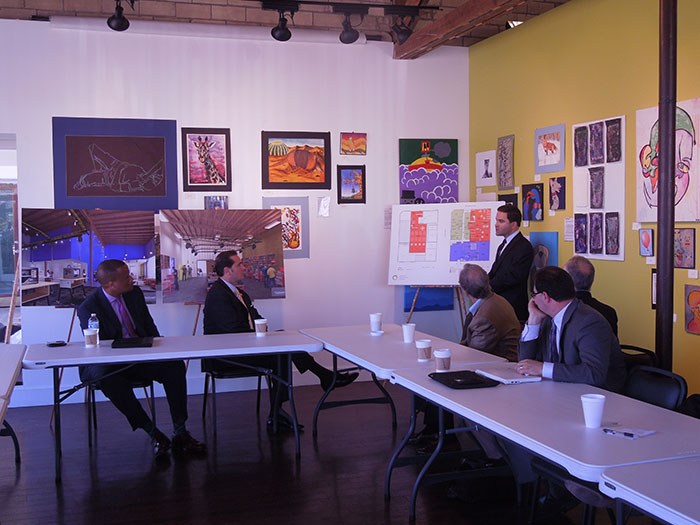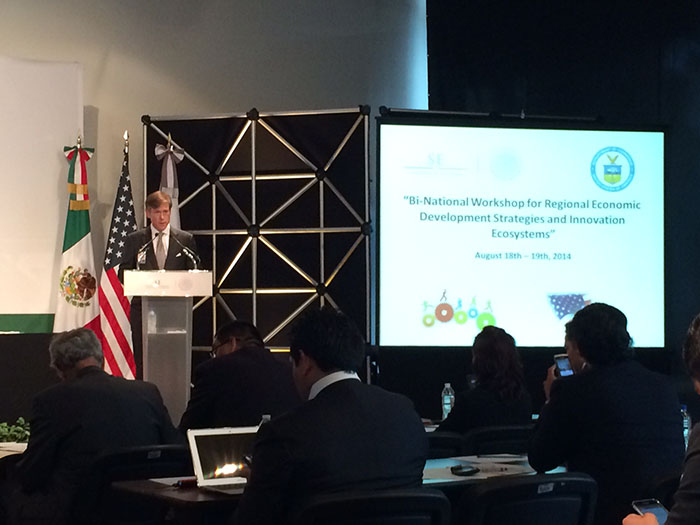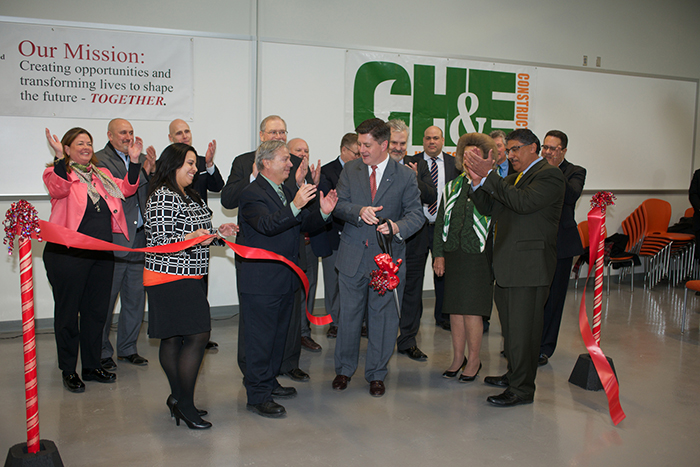Commerce Blog
By Jay Williams, Assistant Secretary for Economic Development
September 29, 2014
 Last week, I was honored to participate in Partnering for Illinois’ Economic Future Second Annual Economic Summit hosted by Congresswoman Cheri Bustos (D-IL) in Rock Island, Illinois. This summit is the highlight of an initiative the Congresswoman launched in 2013 to foster economic collaboration in the 17th Congressional District of Illinois, and my keynote focused on the challenges and opportunities facing the American manufacturing sector, how we can prepare for success in the global economy, and what is being done at the federal level to help regions succeed.
Last week, I was honored to participate in Partnering for Illinois’ Economic Future Second Annual Economic Summit hosted by Congresswoman Cheri Bustos (D-IL) in Rock Island, Illinois. This summit is the highlight of an initiative the Congresswoman launched in 2013 to foster economic collaboration in the 17th Congressional District of Illinois, and my keynote focused on the challenges and opportunities facing the American manufacturing sector, how we can prepare for success in the global economy, and what is being done at the federal level to help regions succeed.
Manufacturing matters:
- Manufacturing supports 17.4 million U.S. jobs.
- Manufacturing career opportunities include engineers, designers, machinists, and computer programmers.
- The annual average salary of manufacturing workers is more than $77,000, which is approximately 17 percent more than similar workers employed in other sectors.
- For every $1.00 spent in manufacturing, the sector creates $1.32 for the U.S. economy.
> Read more
Commerce Blog
By Jay Williams, Assistant Secretary for Economic Development
September 11, 2014
 One of my favorite things about my time as Mayor of Youngstown was having the opportunity to go out and speak to students in local schools. I found myself inspired and energized by their enthusiasm and idealism. It’s so easy to get cynical in this world, but young people tend to be optimistic about the future, and it’s nice to be reminded that there are infinite possibilities for all of us – even those of us who have been out in the world for a while.
One of my favorite things about my time as Mayor of Youngstown was having the opportunity to go out and speak to students in local schools. I found myself inspired and energized by their enthusiasm and idealism. It’s so easy to get cynical in this world, but young people tend to be optimistic about the future, and it’s nice to be reminded that there are infinite possibilities for all of us – even those of us who have been out in the world for a while.
I have had the opportunity to speak to many different audiences in my previous role as the executive director of the auto recovery office and recently as Assistant Secretary. But last week, I got to get back to what I love when Montgomery College invited me to address its Business and Economics majors.
I was humbled by the turnout – in a room that had more than 75 seats, there was standing room only. Most of the students in attendance were minorities or immigrants, and it was very meaningful to me to be able to address such a group as an official of the Obama Administration.
> Read more
September 2014 Newsletter
 There is a perception that innovation and entrepreneurship happen on the coasts while the rest of the country gets left behind. Yes, there are many places in America where the airports are so small you have to travel by puddle jumper to get there, and there is not a proliferation of a certain ubiquitous coffee shop on every block. But when it comes to innovation, size doesn’t matter. Small towns and cities across the country are doing some truly amazing things to support their innovators and entrepreneurs. Recently, Assistant Secretary Jay Williams and DRA Federal Co-Chairman Chris Masingill traveled to Tennessee, Missouri, and Arkansas to meet with local entrepreneurs at the incubators and training facilities that support them to see what innovation looks like with a touch of Southern hospitality.
There is a perception that innovation and entrepreneurship happen on the coasts while the rest of the country gets left behind. Yes, there are many places in America where the airports are so small you have to travel by puddle jumper to get there, and there is not a proliferation of a certain ubiquitous coffee shop on every block. But when it comes to innovation, size doesn’t matter. Small towns and cities across the country are doing some truly amazing things to support their innovators and entrepreneurs. Recently, Assistant Secretary Jay Williams and DRA Federal Co-Chairman Chris Masingill traveled to Tennessee, Missouri, and Arkansas to meet with local entrepreneurs at the incubators and training facilities that support them to see what innovation looks like with a touch of Southern hospitality.
After arriving in Memphis, Assistant Secretary Williams and Chairman Masingill met with several entrepreneurs at Memphis Bioworks, an organization that seeks to create companies, jobs, and investments in bioscience. Some of the solutions presented by companies are brilliant in their simplicity.
> Read more
September 2014 Newsletter
 Economies don’t fit into neat borders of cities, counties, or states. Along the U.S.-Mexico border, they don’t always fit neatly into countries either. There are roughly 2,000 miles of shared border between Mexico and the United States that create a dynamic commercial relationship that generates more than $500 billion in two-way trade and supports millions of jobs in both countries.
Economies don’t fit into neat borders of cities, counties, or states. Along the U.S.-Mexico border, they don’t always fit neatly into countries either. There are roughly 2,000 miles of shared border between Mexico and the United States that create a dynamic commercial relationship that generates more than $500 billion in two-way trade and supports millions of jobs in both countries.
Recognizing this, in May 2013, President Obama and President Peña Nieto announced the formation of the High-Level Economic Dialogue (HLED) to promote economic growth in both countries, create jobs for citizens on both sides of the border, and ensure that the United States and Mexico could compete globally. The first HLED was launched in September 2013, which developed a work plan based on the pillars of promoting competitiveness and connectivity; fostering economic growth, productivity, entrepreneurship, and innovation; and partnering for regional and global leadership.
> Read more
September 2014 Newsletter
 Ensuring employers have a well-trained workforce with the skills employers need is key to economic growth. But it’s impossible to learn a skill if you don’t understand the instruction being given or if there are cultural barriers to the training. Culturally appropriate workforce training is crucial to ensuring a properly trained workforce in many parts of the country, and EDA has supported projects to provide that training in areas ranging from Pennsylvania to California.
Ensuring employers have a well-trained workforce with the skills employers need is key to economic growth. But it’s impossible to learn a skill if you don’t understand the instruction being given or if there are cultural barriers to the training. Culturally appropriate workforce training is crucial to ensuring a properly trained workforce in many parts of the country, and EDA has supported projects to provide that training in areas ranging from Pennsylvania to California.
In 2011, EDA announced a $1.3 million grant in Lancaster, PA to the Spanish American Civic Association (SACA) and the SACA Development Corporation of Lancaster to help renovate a vacant facility for use as the state-of-the-art Bilingual Technology Training Center. The center would extend bilingual and remedial training opportunities to prepare low-income minority clients for high-demand growth jobs in the Lancaster region
> Read more
 Last week, I was honored to participate in Partnering for Illinois’ Economic Future Second Annual Economic Summit hosted by Congresswoman Cheri Bustos (D-IL) in Rock Island, Illinois. This summit is the highlight of an initiative the Congresswoman launched in 2013 to foster economic collaboration in the 17th Congressional District of Illinois, and my keynote focused on the challenges and opportunities facing the American manufacturing sector, how we can prepare for success in the global economy, and what is being done at the federal level to help regions succeed.
Last week, I was honored to participate in Partnering for Illinois’ Economic Future Second Annual Economic Summit hosted by Congresswoman Cheri Bustos (D-IL) in Rock Island, Illinois. This summit is the highlight of an initiative the Congresswoman launched in 2013 to foster economic collaboration in the 17th Congressional District of Illinois, and my keynote focused on the challenges and opportunities facing the American manufacturing sector, how we can prepare for success in the global economy, and what is being done at the federal level to help regions succeed.


 One of my favorite things about my time as Mayor of Youngstown was having the opportunity to go out and speak to students in local schools. I found myself inspired and energized by their enthusiasm and idealism. It’s so easy to get cynical in this world, but young people tend to be optimistic about the future, and it’s nice to be reminded that there are infinite possibilities for all of us – even those of us who have been out in the world for a while.
One of my favorite things about my time as Mayor of Youngstown was having the opportunity to go out and speak to students in local schools. I found myself inspired and energized by their enthusiasm and idealism. It’s so easy to get cynical in this world, but young people tend to be optimistic about the future, and it’s nice to be reminded that there are infinite possibilities for all of us – even those of us who have been out in the world for a while. There is a perception that innovation and entrepreneurship happen on the coasts while the rest of the country gets left behind. Yes, there are many places in America where the airports are so small you have to travel by puddle jumper to get there, and there is not a proliferation of a certain ubiquitous coffee shop on every block. But when it comes to innovation, size doesn’t matter. Small towns and cities across the country are doing some truly amazing things to support their innovators and entrepreneurs. Recently, Assistant Secretary Jay Williams and DRA Federal Co-Chairman Chris Masingill traveled to Tennessee, Missouri, and Arkansas to meet with local entrepreneurs at the incubators and training facilities that support them to see what innovation looks like with a touch of Southern hospitality.
There is a perception that innovation and entrepreneurship happen on the coasts while the rest of the country gets left behind. Yes, there are many places in America where the airports are so small you have to travel by puddle jumper to get there, and there is not a proliferation of a certain ubiquitous coffee shop on every block. But when it comes to innovation, size doesn’t matter. Small towns and cities across the country are doing some truly amazing things to support their innovators and entrepreneurs. Recently, Assistant Secretary Jay Williams and DRA Federal Co-Chairman Chris Masingill traveled to Tennessee, Missouri, and Arkansas to meet with local entrepreneurs at the incubators and training facilities that support them to see what innovation looks like with a touch of Southern hospitality. Economies don’t fit into neat borders of cities, counties, or states. Along the U.S.-Mexico border, they don’t always fit neatly into countries either. There are roughly 2,000 miles of shared border between Mexico and the United States that create a dynamic commercial relationship that generates more than $500 billion in two-way trade and supports millions of jobs in both countries.
Economies don’t fit into neat borders of cities, counties, or states. Along the U.S.-Mexico border, they don’t always fit neatly into countries either. There are roughly 2,000 miles of shared border between Mexico and the United States that create a dynamic commercial relationship that generates more than $500 billion in two-way trade and supports millions of jobs in both countries. Ensuring employers have a well-trained workforce with the skills employers need is key to economic growth. But it’s impossible to learn a skill if you don’t understand the instruction being given or if there are cultural barriers to the training. Culturally appropriate workforce training is crucial to ensuring a properly trained workforce in many parts of the country, and EDA has supported projects to provide that training in areas ranging from Pennsylvania to California.
Ensuring employers have a well-trained workforce with the skills employers need is key to economic growth. But it’s impossible to learn a skill if you don’t understand the instruction being given or if there are cultural barriers to the training. Culturally appropriate workforce training is crucial to ensuring a properly trained workforce in many parts of the country, and EDA has supported projects to provide that training in areas ranging from Pennsylvania to California.